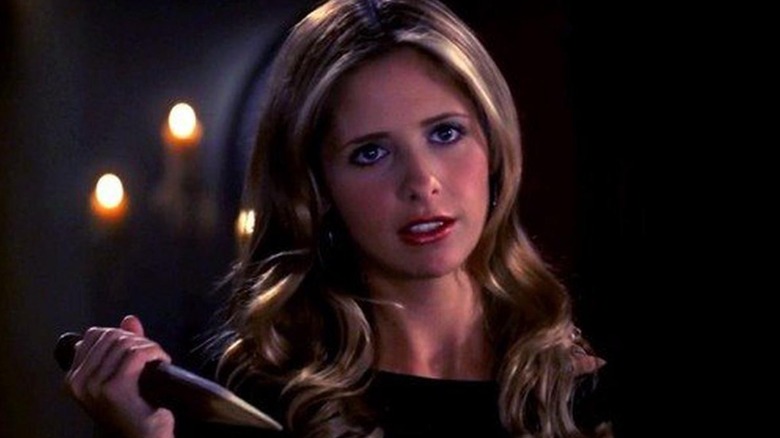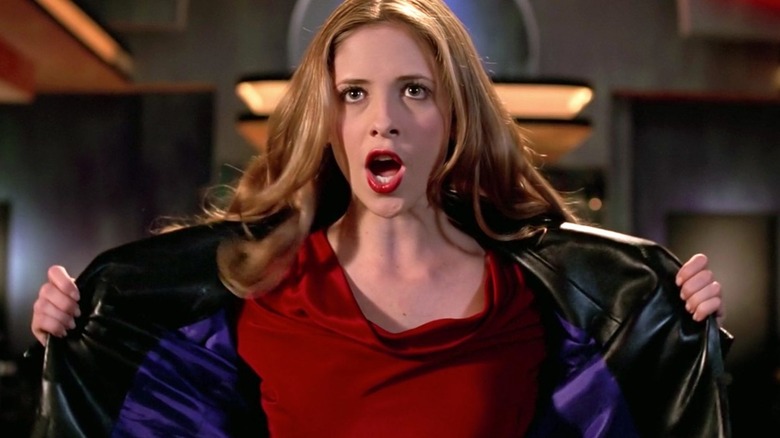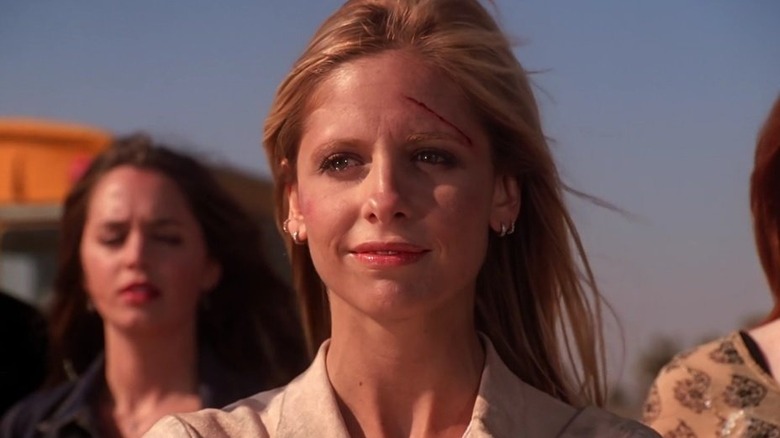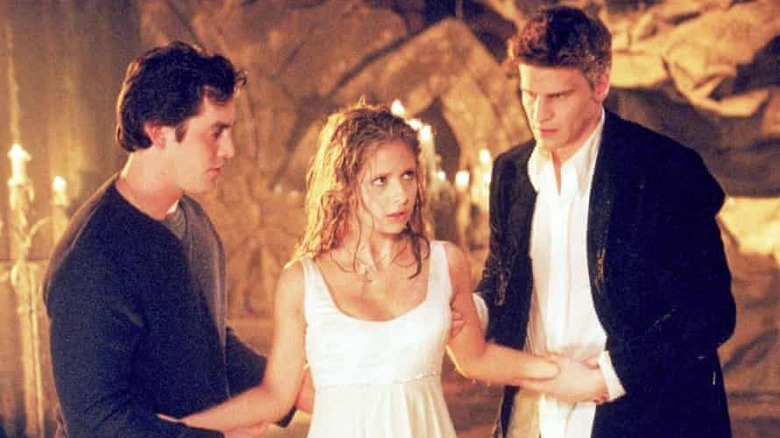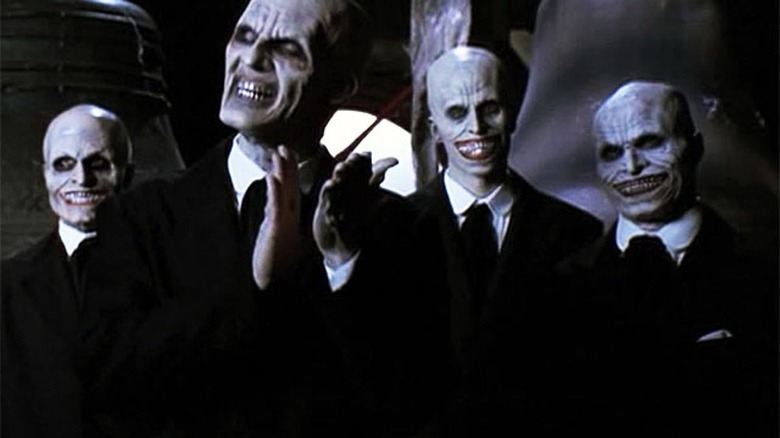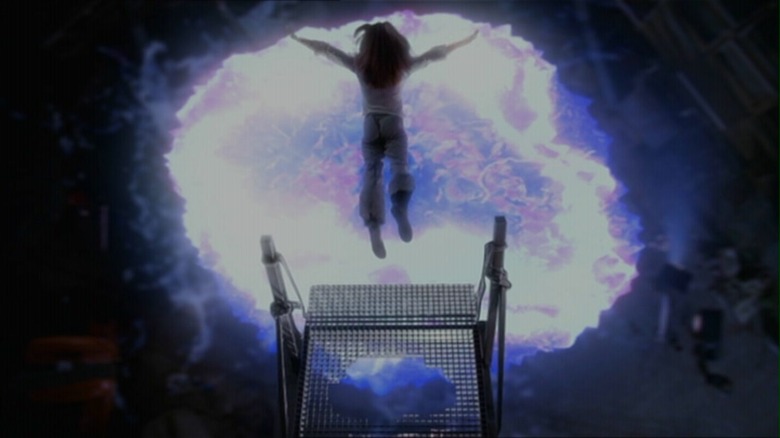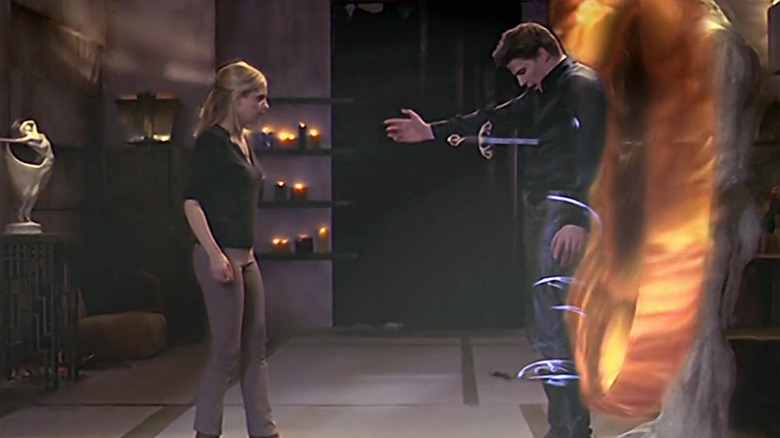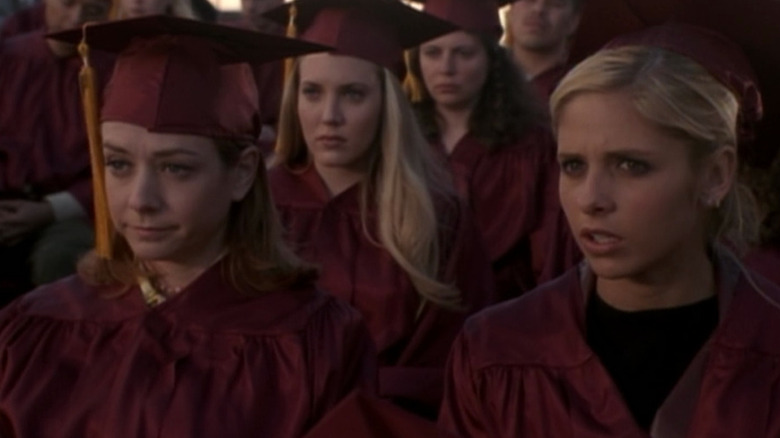Every Season Of Buffy The Vampire Slayer Ranked Worst To Best
"Buffy the Vampire Slayer" was a groundbreaking series that explored the horror, coming-of-age, and adventure genres with an incredible subversion of archetypes and a rich mythology. The series ran for seven reasons and attracted a strong, loyal fanbase who fell in love with the series' memorable characters. "Buffy the Vampire Slayer" was so successful that its spinoff series "Angel" became a hit in its own right, and the crossovers that emerged between the two shows were enthralling.
"Buffy the Vampire Slayer" follows teenager Buffy Summers (Sarah Michelle Gellar), the latest in a line of female warriors called "Slayers" who are tasked with protecting the world from monsters, demons, the undead, and other types of supernatural threats. Each Slayer is protected by a "Watcher" who oversees their training; in Buffy's case, that's the kindly librarian Rupert Giles (Anthony Stewart Head). After a disastrous occurrence in her hometown, Buffy moves to Sunnydale, California for a fresh start.
Buffy faced the responsibilities of saving the world and the challenges of being a teenage girl. Buffy is forced to keep her destiny a secret, but breaks the rule and bonds early on with the shy Willow Rosenberg (Alyson Hannigan) and goofy Xander Harris (Nicholas Brendon). The trio, known as "The Scooby Gang," must survive the literal hell that pursues them and the "hell" of high school. Their gang of friends and allies would expand in later seasons.
Here is every season of "Buffy the Vampire Slayer" ranked from worst to best.
7. Season 6
Season 6 had the challenge of following up Buffy's devastating death in the season 5 finale "The Gift," and finding a satisfying way to justify her return. Bringing characters back from the dead isn't uncharted territory, and initially season 6 goes in an interesting direction thematically; Buffy's friends resurrect her, but she doesn't reveal to them that she was plucked from Heaven. This leaves her in a deep depression that lasts the entire season. Unfortunately, this concept is squandered, and the other characters fare even worse.
For season 6, Joss Whedon scaled back his involvement in the show to devote more time to "Firefly" and "Angel" (although he was still heavily involved in the production), and while new showrunner Marti Noxon is an extremely gifted writer, the result is the most unfocused and unevenly paced season to date. While the series had never shied away from adult themes, season 6 went in increasingly dark directions that were simply uncomfortable to watch. Xander leaves Anya at the altar, Spike attempts to sexually assault Buffy, and Willow embraces dark magic following the death of her lover, Tara. These major twists come without proper development; Willow's villainous turn in particular is a disappointment considering the groundwork that had been laid in the season 3 episode "Doppelgangland."
The one redeeming factor of the season is the musical episode "Once More, With Feeling," which may be the greatest "Buffy the Vampire Slayer" episode of all time. Featuring catchy original songs and choreographed musical numbers, it's a lively bit of fun amidst the darkness.
6. Season 7
After the massive disappointment of season 6, season 7 had to normalize the tone and provide a satisfying conclusion to each of the characters' arcs ahead of the finale, "Chosen." The threat of an impending apocalyptic event that could unleash the Hellmouth's deepest evils creates a season-long buildup to the final battle, and the result is another dark chapter in the Buffyverse. Season 7 struggles to rectify the fundamental changes made to the characters, with Xander taking responsibility for his misdeeds by becoming a Watcher-in-training, Spike beginning his long road to redemption, and Willow coping with her addiction to magic. At the very least, the Scooby Gang begins to feel like themselves again, and a bit of the show's early whimsy returns despite the threat looming over them.
Unfortunately, the season has problems of its own. As with season 6, there's a good idea at its core, which is Buffy gathering an army of potential Slayers and training them as the next generation of monster-hunters. It's a great way to pass the torch and put all of the characters in a vulnerable state; Buffy is forced to adopt a mentor role, and the trainees must adapt quickly as they prepare for the battle with the First Evil. However, none of the new characters are particularly memorable, and the new villain, Caleb (Nathan Fillion), is painfully generic. However, "Chosen" is a satisfying enough ending that brings Buffy, Willow, and Xander back to Sunnyvale High School, where their adventure began.
5. Season 1
The 1st season of "Buffy the Vampire Slayer" is also the shortest, having to establish the core mythology, introduce the main characters, and demonstrate the show's tone by weaving an ongoing arc featuring its first Big Bad, the Master (Mark Metcalf), with fun standalone adventures in a mere 12 episodes. It's successful in this regard, as Buffy, Willow, Xander, and Giles are all instantly likable, and their dynamic is well-established in the pilot. The Master's plot to unleash literal hell on Sunnyvale High School isn't particularly original, but he serves a purpose in introducing the vampire culture and history that would be explored with more depth in the later seasons.
However, as a result of the time needed to handle so much exposition, the characters are far closer to caricatures and the storylines are much simpler. Buffy is relatively well-handled, but Willow's social awkwardness and Xander's lust for romance fall closer to the cliches that the show was known for subverting. The 1st season also suffers from some of the worst standalone episodes; Xander's infatuation with an attractive teacher (who turns out to be a praying mantis) in "Teacher's Pet" and Willow's romance with an online pen pal (that's actually an evil robot) in "I, Robot... You, Jane" are notable lows.
However, there were hints at the show's potential. The introduction of Angel (David Boreanaz) gives the season an aura of mystery, and Buffy's shock at learning that her crush is a vampire makes for a compelling twist.
4. Season 4
Season 4 came during a transitional phase for "Buffy the Vampire Slayer." The first season to abandon the high school setting followed Buffy and Willow as they enroll in UC Sunnyvale, while Xander becomes a construction worker. It also marked the absence of Angel, who left Buffy behind in the season 3 finale to become a private investigator in Los Angeles, thus setting up his spinoff series. The transitions are very awkward, as Xander and Giles' roles became increasingly unclear; the departure of Willow's lover Oz is very sudden, but it does lay the groundwork for her new lover, Tara, to join the cast.
The biggest issue with season 4 is its villain. The underground facility known as "the Initiative" is intriguing, but the storyline is abandoned halfway through to incorporate the Frankenstein-esque monster Adam (George Hertzberg). Following the lively and nuanced antagonists of the previous seasons, a purely evil creature is a major letdown. The season also introduced Buffy's new love interest, Riley Finn (Marc Blucas), a character so dull that he'd eventually be written out midway through season 5.
While the main narrative was lacking, season 4 features some of the strongest standalone episodes. The silent episode "Hush" is easily the scariest of the entire series; it introduced demonic creatures known as "the Gentlemen," who leave Sunnyvale devoid of sound. More comedic episodes include "Something Blue," in which Willow's magical spells have the opposite effects of what she intended, and "Superstar, in which the geeky Jonathan rewrites history to become the show's main character.
3. Season 5
While season 4 struggled to move on from the show's high school roots and season 6 pushed the narrative in increasingly uncomfortable directions, season 5 succeeds as a legitimately mature work of television. At this point, the characters had grown into their responsibilities, and the series adopted a more serialized format as it established the latest antagonist, Glory (Clare Kramer), an ancient god. Kramer's performance is eccentric, which contrasts nicely with the darker overall tone.
As a result of the heavier serialization, there are fewer self-contained episodes, but a few installments in particular stand out. If season 6's "Once More, With Feeling" is the show's most rewatchable episode, season 5's "The Body" is the most devastating. In an episode mostly devoid of magic and monsters, Buffy copes with the immediate aftermath of the death of her mother, Joyce (Kristine Sutherland). It's a sensitive depiction of immediate shock and grief, and features Gellar's strongest performance in the show's entire run.
Season 5 rectifies the mistakes made with the male characters in season 4; Giles is given a purpose by taking ownership of the magic shop, Xander sheds his childlike behavior to embark on a serious relationship with Anya, and Riley is written out. While the addition of Buffy's younger sister Dawn (Michelle Trachtenberg) creates a compelling mystery, as her unexpected insertion into Buffy's world is not immediately explained, Dawn is highly irritating. However, her relationship with Buffy is heartfelt and creates a tear-jerking season finale in "The Gift."
2. Season 2
Season 1 laid the groundwork for the characters and mythology, but it was a campy iteration of a fun "high school is hell" metaphor featuring a new, goofy monster each week. Season 2 showed the potential "Buffy the Vampire Slayer" had as a more serious show that tackled the realities of growing up. It also added one of the show's most complex characters: Spike (James Marsters). Introduced in "School Hard" as a tormented, yet humorous vampire leader, Spike would become integral to the series as his allegiances shifted in later seasons.
Season 2 has the most focused narrative of the show's run. Buffy falls deeply in love with Angel, but after the two become intimate, her lover is transformed into his darker, soulless former self: the wicked vampire Angelus. It was a brilliant metaphor for adolescent guilt and anxiety about sexual relationships. Angelus teams with Spike and Drusilla (Juliet Landau) to become the season's main antagonist, creating a more personal threat than the generic evil of the Master. Buffy's final standoff against Angel in the two-part season finale "Becoming" is one of the emotional high points of the series.
Outside of the vampire alliance, standalone episodes were also strong. "Halloween" offers a fun spin on the characters when they begin to embody their costumes, and "Lie to Me" took a mature look at a radical gang searching for immortality. But there were low points too, particularly Xander's infatuation with an ancient princess in "Inca Mummy Girl."
1. Season 3
Season 3 marked the culmination of the Scooby Gang's high school years, as they prepare for both their graduation and the apocalyptic threat of the new villain Mayor Richard Wilkins (Harry Groener), a snakelike entity who plans to "ascend" during their commencement speech. The looming threat, combined with the pressures of growing older, makes each of the characters more vulnerable, but season 3 revels in all the fun of their last year together.
Spike is absent from the core cast, but he has a fun guest turn in "Lovers Walk" when he returns searching for a love spell for Drusilla. "The Wish" is one of the darker episodes "Buffy," showing an alternate reality where Buffy is absent from Sunnyvale; the appearance of Willow's evil clone in "Doppelgangland" cleverly foreshadows her own darkness. While the past seasons struggled with Xander-centric episodes, "The Zeppo" brilliantly deconstructs the show's episodic formula by focusing on Xander's goofy adventures while the main Scooby Gang deals with a supernatural attack. The addition of the new Slayer Faith (Eliza Dushku) added a more complex dynamic to the core cast, as she ultimately switches allegiances to join forces with The Mayor.
Everything leads to the epic two-part season finale, "Graduation Day," in which the Scoobies face off against the mayor's army and inspire their graduating class to join in the fight. It ends on the perfect note, with the gang watching their school's destruction and reflecting on the totality of their high school experiences.
